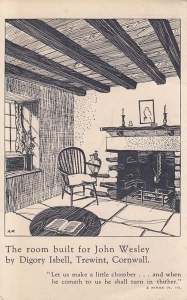
 |
||||||||||
| June 17th | John Wesley (Birth) |
|
John Wesley (1703 – 1791) had an enormous effect on the religious life and behaviour on the ordinary people of Cornwall, after an initial suggestion by his brother, Charles Wesley (July 30th), that Cornwall might be fertile territory for their beliefs. John made thirty-two visits to Cornwall, travelling on horseback when such a journey between London and Cornwall took at least six days each way. Although both Wesley brothers were ordained clergy of the Church of England, they were denied entry to most Churches in Cornwall and resorted to preaching outdoors. Furthermore, due to the antipathy of Cornish Anglican clergy to revivalism, many of their parishioners were encouraged to protest against them. On initial visits to both St. Ives and Falmouth, John Wesley was met with abuse, threats, thrown stones and violence to the extent that he was lucky to escape with his life in Falmouth. Nevertheless, the power of his preaching, his eloquence and his ability to connect with the ordinary people of Cornwall, assuring them that each and every person was accepted as a Child of God, made the county the foremost Methodist area. At one point it was estimated that half of the population described themselves as Methodists. In later years, when Methodism separated from the Anglican Church the country was divided into six Methodist circuits of which the St. Ives circuit was by far the largest in terms of congregation numbers. In the 18th century, the poverty of much of the Cornish population led many to heavy drinking even as children. Miners endured long journeys on foot to the mine, eight hours underground in appallingly hot and dirty environments and had to ascend hundreds of feet by ladder at the end of their shifts. At the same time, farmers worked in appalling weather, often even barefoot and with flimsy clothing. Many assuaged their hard lives with excessive alcohol consumption, further reducing the lifespans of many. Wesley was deeply concerned with the economic and physical wellbeing of the population and not just their intellectual and religious beliefs. A strong proponent of teetotalism, he also founded medical dispensaries supplying medicines free of charge or for a nominal sum. This, alone, led to an improvement in life expectancy and general health. Determined that his writings could reach the masses, Wesley also ensured that his publications were sold as cheaply as possible. The power of Wesley’s rhetoric and persuasion is vividly demonstrated by his arrival, in appalling weather, at a cottage in Trewint near Altarnun inhabited by Digory Isbell and his wife, Elizabeth Burnard. The couple were so taken by Wesley’s deportment and beliefs that the Isbells constructed a room adjacent to their cottage for Wesley’s use (pictured left) whenever he was travelling in Cornwall. Trewint Cottage is now a museum dedicated to the history of Cornish Methodism.
|
 |